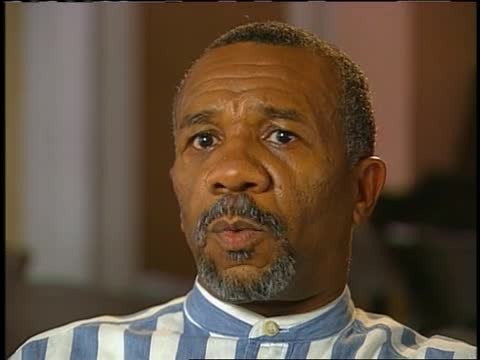Basic Black; 3214; Second Chances: Life After Incarceration
- Series
- Basic Black
- Episode Number
- 3214
- Producing Organization
- WGBH Educational Foundation
- AAPB ID
- cpb-aacip-15-12m64dwb
If you have more information about this item than what is given here, or if you have concerns about this record, we want to know! Contact us, indicating the AAPB ID (cpb-aacip-15-12m64dwb).
- Description
- Episode Description
- In 1999, 38-year-old Tracy Parks was released from prison after serving seven years for carjacking. With the help of the Union Baptist Church in Cambridge, whose pilot program helps ex-offenders find gainful employment in Boston's booming construction industry, Parks found a job as a union laborer. He also married and fathered a child. This is an optimistic tale of one man's second chance at life--his struggle to find redemption and happiness and, in the process, help others overcome the challenges of life after incarceration. Every year approximately 20,000 inmates are released from prisons in Massachusetts. The Massachusetts Department of Correction reports that, on average, ex-convicts re-offend within three years of release. Fifty-three percent of black inmates are re-incarcerated after three years, compared to forty-two percent of white inmates. In "Second Chance: Life After Incarceration," WGBH's award-winning series Basic Black profiles ex-offender Tracy Parks. His efforts to rebuild his life inspired leaders at the Union Baptist Church in Cambridge to create Second Chance, a pilot program designed to help ex-offenders build community support and find employment in Boston's booming construction industry. In May 2000, 37-year-old Parks was released from the Suffolk County House of Corrections after serving seven years for car jacking. Shortly after his release, he got married, started a family and secured a job as a union construction laborer. His new wife, Damali Omolade, introduced Parks to Union Baptist Church where he began to try to give back to the community by helping to establish the Second Chance ministry. "Coming out of incarceration everybody knows, it ain't easy," says Parks during a Second Chance meeting. "Old habits become familiar, the new habits become hard, and it's easier to go back to jail than it is to get up every morning at 5:30am and go to work." In the Boston area approximately 250 prisoners are released each month, often facing no job prospects and limited support. Reverend Jeffrey Brown of Union Baptist Church, who helped spearhead the Second Chance program, says, "What some studies have concluded is that the rate of recidivism decreases dramatically when you're able to connect a given individual to a church, or some faith-based organization." George Brock, a chaplain of the Suffolk County House of Corrections, sees this faith-based, hands-on program as a useful way of instilling a sense of responsibility and self-discipline in people who have been surrounded by negative influences in their neighborhoods and families. "When we look again at who's in prison, we find about 60% had a family member who served time. We're carrying on a tradition that doesn't need to be carried on," says Brock. Parks embodies this statistic -- his brother is currently serving life in prison for the murder of their grandmother. The documentary is as much about past perceptions of ex-offenders as it is about their post incarceration progress. Parks' cousin, Beverly Nelson, is hopeful about his success, yet says he has shown signs of reform in the past, only to revert to his negative behavior. "I hope it lasts a long time," says Nelson, "but he's done this before. I hope Tracy doesn't fall off the wagon. I hope be stays with God, so he can be the sweet person that he is, and let others see that sweet person." Parks' wife, Damali, also worries about the future. "My biggest fear is that all hell will break loose and he'll go back out and things will happen," she says. "But if things go great, we'll have something wonderful." Rev. Brown recognizes that the success of the members of Second Chance, as well as the success of the program, is not guaranteed. "I don't have blinders on, I know that Second Chance is a risk for Union Baptist Church," said Rev. Brown. "And I know that it is a risk personally, for me to have this program move forward. But I also believe that the essence of the Church for the 21st century is about taking these kinds of risks." Parks also expresses concern that he and other Second Chance members may backslide into their old ways. "My fear is that when I hold my meetings, one, two, three, four, or maybe all six other members won't be there," says Tracy. "And when I go to pick up the phone they'll say, 'X got arrested. Z is back on drugs. C is out there in the streets somewhere.'"
- Description
- No description available
- Media type
- Moving Image
- Duration
- 00:31:07;19
- Credits
-
-
Producing Organization: WGBH Educational Foundation
Production Unit: Local Productions
Production Unit: Local Productions
- AAPB Contributor Holdings
If you have a copy of this asset and would like us to add it to our catalog, please contact us.
- Citations
- Chicago: “Basic Black; 3214; Second Chances: Life After Incarceration,” American Archive of Public Broadcasting (GBH and the Library of Congress), Boston, MA and Washington, DC, accessed April 26, 2025, http://americanarchive.org/catalog/cpb-aacip-15-12m64dwb.
- MLA: “Basic Black; 3214; Second Chances: Life After Incarceration.” American Archive of Public Broadcasting (GBH and the Library of Congress), Boston, MA and Washington, DC. Web. April 26, 2025. <http://americanarchive.org/catalog/cpb-aacip-15-12m64dwb>.
- APA: Basic Black; 3214; Second Chances: Life After Incarceration. Boston, MA: American Archive of Public Broadcasting (GBH and the Library of Congress), Boston, MA and Washington, DC. Retrieved from http://americanarchive.org/catalog/cpb-aacip-15-12m64dwb
